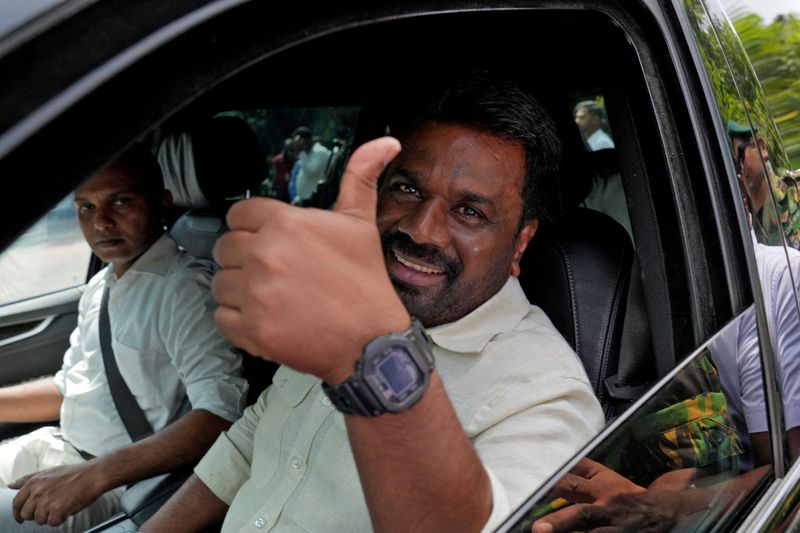By Uditha Jayasinghe and Sudipto Ganguly
COLOMBO (Reuters) -Sri Lankan President Anura Kumara Dissanayake's leftist coalition won a thumping victory in a snap general election, gaining power to push through his plans to fight poverty in the island nation recovering from a financial meltdown.
Dissanayake's Marxist-leaning National People's Power (NPP) coalition won 137 seats of 196 for which direct elections were held, a two-thirds majority, Friday's ballot counting showed. Local media projected its tally would cross 150 in the 225-member parliament after more seats are distributed under a proportional seat distribution system.
That would give Dissanayake sweeping powers to even abolish the contentious executive presidency as he has planned.
While the clear mandate strengthens political stability in the South Asian country, some uncertainty on policy direction remains due to Dissanayake's promises to try and tweak the International Monetary Fund (IMF) rescue programme that bailed the country out of its economic crisis, analysts said.
Dissanayake, a political outsider in a country dominated by family parties for decades, comfortably won the island's presidential election in September.
But his coalition had just three seats in parliament before Thursday's snap election, prompting him to dissolve it and seek a fresh mandate.
The NPP secured almost 62% or almost 7 million votes in Thursday's election, up from the 42% Dissanayake won in September, indicating that he had drawn more widespread support including from minorities and built on his victory.
"We see this as a critical turning point for Sri Lanka. We expect a mandate to form a strong parliament, and we are confident the people will give us this mandate," Dissanayake said after casting his vote on Thursday.
"There is a change in Sri Lanka's political culture that started in September, which must continue."
Voters directly elect 196 members to parliament from 22 constituencies under a proportional representation system. The remaining 29 seats will be distributed according to the island-wide proportional vote obtained by each party.
TENTATIVE ECONOMIC RECOVERY
Celebrations were largely muted, with the exception of a few NPP loyalists who lit fireworks on the outskirts of the capital, Colombo.
The Samagi Jana Balawegaya party of opposition leader Sajith Premadasa, the main challenger to Dissanayake's coalition, won 35 seats and the New Democratic Front, backed by previous President Ranil Wickremesinghe, won just three seats.
Sri Lanka typically backs the president's party in general elections, especially if voting is held soon after a presidential vote.
The president wields executive power but Dissanayake still required a parliamentary majority to appoint a fully-fledged cabinet and deliver on key promises to cut taxes, support local businesses, and fight poverty.
A nation of 22 million, Sri Lanka was crushed by a 2022 economic crisis triggered by a severe shortage of foreign currency that pushed it into a sovereign default and caused its economy to shrink by 7.3% in 2022 and 2.3% last year.
Boosted by a $2.9 billion bailout programme from the International Monetary Fund (IMF), the economy has begun a tentative recovery, but the high cost of living is still a critical issue for many, especially the poor.
Dissanayake also aims to tweak targets set by the IMF to rein in income tax and free up funds to invest in welfare for the millions hit hardest by the crisis.
But investors worry his desire to revisit the terms of the IMF bailout could delay future disbursements, making it harder for Sri Lanka to hit a key primary surplus target of 2.3% of GDP in 2025 set by the IMF.

"The country has given a clear mandate politically. The key question would be if this is at the cost of economic policy," said Raynal Wickremeratne, co-head of research at Softlogic Stockbrokers in Colombo.
"I think with this majority they may try to negotiate a bit more on the (IMF) targets as well," he said. "A continuation of the current reform programme on a broader extent would be positive for the country."